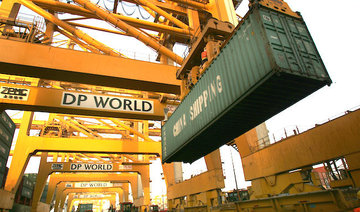NEW DELHI: India’s antitrust watchdog has ordered Denmark’s A.P. Moller-Maersk and Dubai’s DP World to withdraw certain customer advisories which it said could hamper growth of the country’s largest container port in Mumbai, a document seen by Reuters showed.
The Competition Commission of India (CCI) last year ordered a probe into suspected antitrust violations by DP World and Maersk units at the terminals they operate at state-owned Jawaharlal Nehru Port Trust (JNPT).
Handling 66 million tons of cargo in the last fiscal year to March, JNPT is critical to India’s international trade. The port handles more than half of India’s traffic in shipping containers each year.
The probe was ordered as the CCI found merit in a complaint filed by Singapore’s PSA International, which alleged the rival duo had created barriers to hinder the growth of PSA’s terminal by colluding on certain charges they levy at the port.
Though the terminal operators handle each other’s containers to help boost the port’s efficiency, PSA had alleged that DP World and Maersk last year issued advisories aimed at discouraging port users from sending PSA’s containers to their terminals.
In an order issued by the CCI on Jan. 15, the watchdog ordered Maersk and DP World units to withdraw those advisories, saying it “smacks of anti-competitive” conduct.
The advisories, if not withdrawn, would cause “irretrievable damage or losses” not only to PSA, and would not augur well for the port’s development, according to the order. It has not been made public.
“This is likely to generate unwarranted uncertainty, chaos, discontent and anxiety among shipping lines and customers,” the CCI said.
The order is only an interim measure, and the wider probe continues.
A DP World spokesperson said the company had not received any such order from the Indian watchdog, but it was “committed to ensuring” it complies with all laws.
A.P. Moller-Maersk, the world’s biggest container shipping group, did not respond to queries. PSA, which is owned by Singapore government-owned investment fund Temasek Holdings, declined to comment.
The antitrust dispute at the JNPT is based on so-called inter-terminal transfers.
Under the system, freight trains arriving at JNPT typically carry containers destined for several terminals, but stop at just one that handles all the cargo on a given day. Other operators then collect their containers by truck for loading at their own terminals. A similar procedure is followed, in reverse, when imported containers are unloaded.
DP World’s advisory had said the inter-terminal operations with PSA were “inefficient and unviable.” Maersk had said its terminal “shall not be responsible” for handling containers to and from PSA-terminal bound trains.
Both the companies denied PSA’s allegations while arguing to the CCI that the advisories were based on “commercial justifications,” the order said.
Units of Maersk, DP World and PSA operate four of the JNPT port’s five terminals, with the fifth owned by the government. The PSA terminal, inaugurated in February, is planned to be the largest, expected to nearly double JNPT’s capacity.
India antitrust watchdog issues advisories to DP World, Maersk units operating at Mumbai port
India antitrust watchdog issues advisories to DP World, Maersk units operating at Mumbai port

- The Competition Commission of India last year ordered a probe into suspected antitrust violations by DP World and Maersk units
- The antitrust dispute at the JNPT is based on so-called inter-terminal transfers
Pakistan high court pauses tree-cutting in Islamabad until Feb. 2

- Islamabad High Court asks CDA to ‘explain and justify’ tree-cutting at next hearing
- CDA officials say 29,000 trees were cut due to allergies, deny felling in green belts
ISLAMABAD: The Islamabad High Court has ordered an immediate halt to tree-cutting in the federal capital until Feb. 2, seeking justification from civic authorities over the legality of a large-scale felling drive that has seen thousands of trees removed in recent months.
The interim order, issued by a single-judge bench led by Justice Khadim Hussain Soomro, came during proceedings on a petition challenging the Capital Development Authority’s (CDA) tree-cutting operations in Islamabad’s Shakarparian area and H-8 sector.
At the outset of the hearing, the petitioner’s counsel argued that trees were being felled in violation of the Pakistan Environmental Protection Act 1997, the Islamabad Wildlife Ordinance 1979 and the city’s master plan.
“Respondents shall not cut trees till the next date of hearing,” Justice Soomro said in the court order released on Friday while referring to CDA officials.
“Respondents are directed to come fully prepared and to file paragraph-wise comments before the next date of hearing, along with a comprehensive report explaining the justification and legal basis for the cutting of trees,” he added.
According to the court order, the petitioner maintained that the CDA had not made any public disclosure regarding the legal basis for the operation and that the felling was causing environmental harm.
The petition sought access to the official record of tree-cutting activities and called for the penalization of CDA officials responsible for the act under relevant criminal and environmental laws.
It also urged the court to impose a moratorium on infrastructure projects in Islamabad, order large-scale replanting as compensation and constitute a judicial commission headed by a retired Supreme Court judge to probe the alleged violations.
CDA officials acknowledge around 29,000 paper mulberry trees have been cut in the capital in recent months, arguing that the species triggers seasonal allergies such as sneezing, itchy eyes and nasal congestion.
They also maintain that no trees have been removed from designated green belts and that the number of replacement trees planted exceeds those felled.
Designed in the 1960s by Greek architect Constantinos Doxiadis, Islamabad was conceived as a low-density city with green belts and protected natural zones at its core.
Critics, however, say the recent felling has extended beyond paper mulberry trees and question whether authorities are adhering to the city’s master plan and the legal protections governing forested and green areas.
The court has adjourned its hearing until Feb. 2, 2026.










